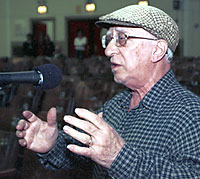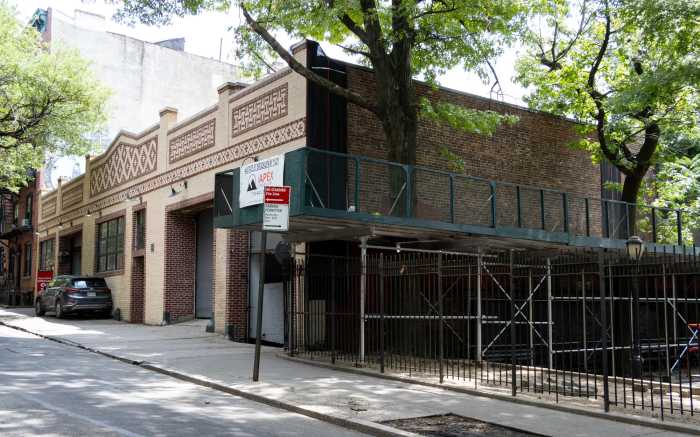At first glance, the media-savvy activists of Prospect Heights and the
working-class families of Bensonhurst seem the dictionary definition of
“odd couple.”
But faced with a rash of what they describe as predatory development,
nearly a hundred homeowners and other residents turned out for a town
hall meeting sponsored by Borough President Marty Markowitz and saw past
their differences.
The majority of attendees in the auditorium of Seth Low Intermediate School,
on Avenue P at West 11th Street Tuesday night called upon elected politicians
to quash out-of-character new construction in both the brownstone-dominated
neighborhoods of Prospect Heights and Park Slope and the detached and
semi-detached landscapes of Bay Ridge and Bensonhurst.
[The next overdevelopment meeting, according to Markowitz’s Web site,
is scheduled for May 31 at 6 pm. It will be held at a public school in
Marine Park, at 1925 Stuart St. at Fillmore Avenue.]
“I’ve been in city government for 30 years and I’ve never
been so ashamed as right now to be a part of it,” said Howard Feuer,
district manager of Community Board 11, who sat on the panel of officials
at the May 10 town hall.
“All you have to do is look right around the corner to see what I’m
talking about,” Feuer said.
In particular, he and other homeowners in Bensonhurst pointed to a swath
of 65th Street near Bay Parkway, where since late last year a seven-story
apartment building has raised the ire of its neighbors, all owners of
two-family homes.
Louis Powsner, another Bensonhurst resident who spoke at the meeting,
echoed Feuer’s sentiments and added that at least five four-story
condos have sprouted where developers knocked down as many two-family
homes on West Sixth Street near Avenue P.
“And they’re getting close to my house,” Powsner added.
Feuer was among more than two dozen community members who spoke on the
topic, which, judging from the response, has been simmering on the minds
of many for a long time. From the placard-toting members of Develop-Don’t
Destroy Brooklyn, who lamented the eminent domain-dependent plans for
a basketball arena and office tower complex in Prospect Heights, to longtime
Bensonhurst residents who charged that developers were replacing two-family
homes with garish six-story condominiums, all had a story to tell.
Lorraine Lapetina, president of the group Gravesend-Bensonhurst Quality
of Life, said that even as a 120-block rezoning of her neighborhood nears
passage, developers continue to buy-up two-family homes, the area’s
predominant style of dwelling.
Besides the larger condominiums erected in their place, remaining two-family
homes are allowed to expand beyond good sense, she said, thanks to the
ease of obtaining zoning variances and the city Department of Building’s
self-certification policy for developers.
“Bensonhurst is making its way through the public review process,”
said Markowitz in a brief opening statement at the meeting. “However,
throughout much of southern and western Brooklyn, zoning does not closely
match the low-rise residential buildings that commonly exist there.”
Then he, Councilman Domenic Recchia, Assemblyman William Colton and Community
Board 10 Chairman Craig Eaton turned the floor over to residents, albeit
limiting them to three minutes each.
While it seemed more an opportunity to vent about problems than a means
of solving them, a spokesman said Markowitz and his staff would reveiw
the meeting notes and survey the problems raised by audience members.
In Prospect Heights, plans are underway for a 17,000-seat basketball arena
to house the New Jersey Nets, the centerpiece to a project that would
also include 13 commercial and residential towers.
“We are one Brooklyn,” said Patti Hagan, president of the Prospect
Heights Action Coalition. “And Brooklyn has become an endangered
species.”
Hagan and others in Prospect Heights took the opportunity to face down
Markowitz, who they blame along with Mayor Michael Bloomberg for allowing
the Atlantic Yards arena plan to flourish in their neighborhood. If they
seemed out of place at the town hall meeting, which had been planned to
tackle development issues pertaining to southern Brooklyn, none in attendance
seemed to mind.
But responding to suggestions from some speakers that the Department of
City Planning should create one comprehensive zoning plan for all of Brooklyn,
Regina Weiss, Markowitz’s communications director, said that not
all neighborhoods are the same.
“They’re here to express their passion,” said Weiss. “But
there are significant differences. When people want to compare West Third
Street and the corner of Flatbush Avenue and Atlantic Avenue, you’re
comparing apples and oranges.”

























